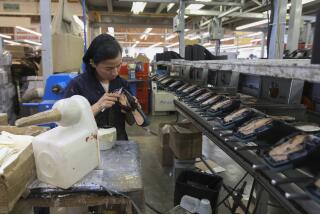Goals, Not Gestures, for U.S.-Japan Trade
- Share via
Japan now accounts for a whopping 47% of America’s total trade deficit when you take oil out of the picture. An incredible 86% of Japan’s total trade surplus comes from what it sells in just one single market--the United States.
Now, that’s a big problem for us, because it has cost us billions of dollars and hundreds of thousands of jobs, and when jobs get sucked out, so does our ability to hang on to our standard of living. But this may be an even bigger problem for Japan, because it can’t afford a $50-billion dependence on just one market.
Japan has gotten hooked on the willingness of Americans to buy so many of its exports. That over-dependence ought to scare the Japanese, for three reasons.
First, in a world where everybody pays lip-service to free trade and hardly anybody practices it, Japan has almost no place else to sell those exports.
Second, Japan really doesn’t sell us anything we couldn’t do without if we had to--we don’t buy food or natural resources from Japan. But Japan depends on America for all the jobs that go with that 86% trade surplus.
And third, Japanese trade practices over the years have violated the closest thing we have in America to a state religion--fairness! Americans have begun to feel they are being had.
American frustration finally boiled over last year when the Senate voted 92-0 to tell the President to retaliate if Japan didn’t open its market to more U.S. goods and start trading fairly with us. Then, a few months ago the House passed a trade bill that would penalize Japan if the trade gap doesn’t start narrowing to a more acceptable level.
The House bill proposes a goal of reducing the trade deficit with Japan by 10% a year unless the Japanese change their trade policies. We need a firm goal. For too long now we’ve been haggling with the Japanese over baseball bats one day and cigarettes the next, while the problem gets worse. This piecemeal approach hasn’t worked. Neither have good intentions and some sincere efforts on both sides.
There has been some real progress. The Japanese deserve credit for helping to raise the value of the yen by more than 50%. They’ve shown restraint on auto exports. And Prime Minister Yasuhiro Nakasone put his political future on the line by trying to get the Japanese to “buy American.”
The Tokyo government even tried to crack the workaholic tradition of the Japanese by setting up a “leisure development center.” The idea is to get people to take time off and enjoy themselves, to catch up on some sleep, and maybe even spend some of their Saturdays riding motor scooters instead of building them.
Treasury Secretary James A. Baker III says that even despite the currency adjustments he negotiated, America’s trade deficit remains “politically unacceptable and, ultimately, economically unacceptable.” Neither country can afford it, so we need a firm goal and tougher action to fix the problem before it’s too late.
And what’s wrong with a simple goal, anyway? The Japanese are goal-oriented. Americans are goal-oriented. Businessmen understand goals. So let’s get together as friends and set some goals.
We shouldn’t tell the Japanese how to cut their dependence on us. We shouldn’t say “so much of this, so much of that.” We’ve got no right to meddle in Japan’s affairs and dictate how they should solve their end of the problem.
But we’ve got the right to say: “This year we can only afford this much red ink, and next year this much. It’s up to you. Buy more or sell us less--your choice.”
Some people would ask: “Is it fair for Japan to have to pay most of the cost of fixing this imbalance?” Yes, it is, because Japan has gained the most from this lopsided trade, and it stands to lose the most if its over-dependence on the American market continues. It’s fair, and it’s also in Japan’s self-interest to pay a reasonable price now, rather than an unacceptable price later on.
The problem is too big now just to deal in good intentions. We need results. We need an actual reduction of that deficit, and we need a new perception of fairness about our whole trade relationship.
More to Read
Inside the business of entertainment
The Wide Shot brings you news, analysis and insights on everything from streaming wars to production — and what it all means for the future.
You may occasionally receive promotional content from the Los Angeles Times.










